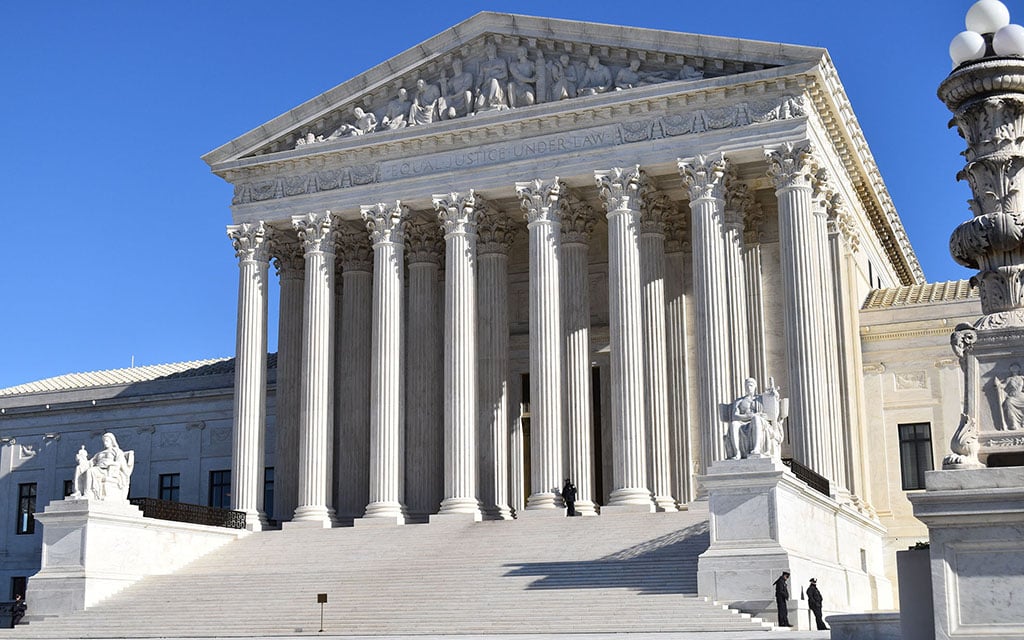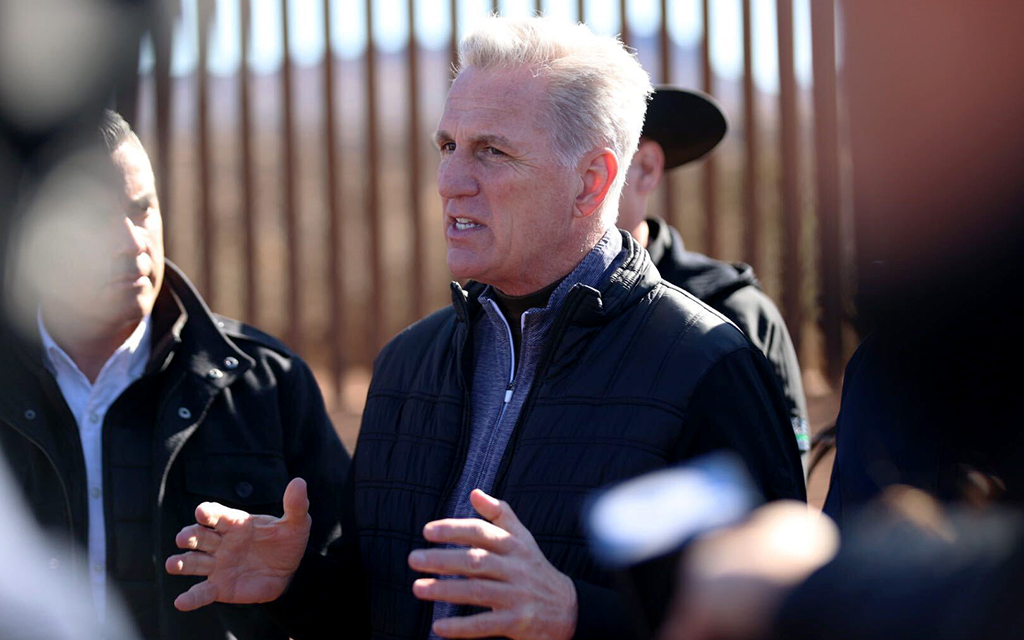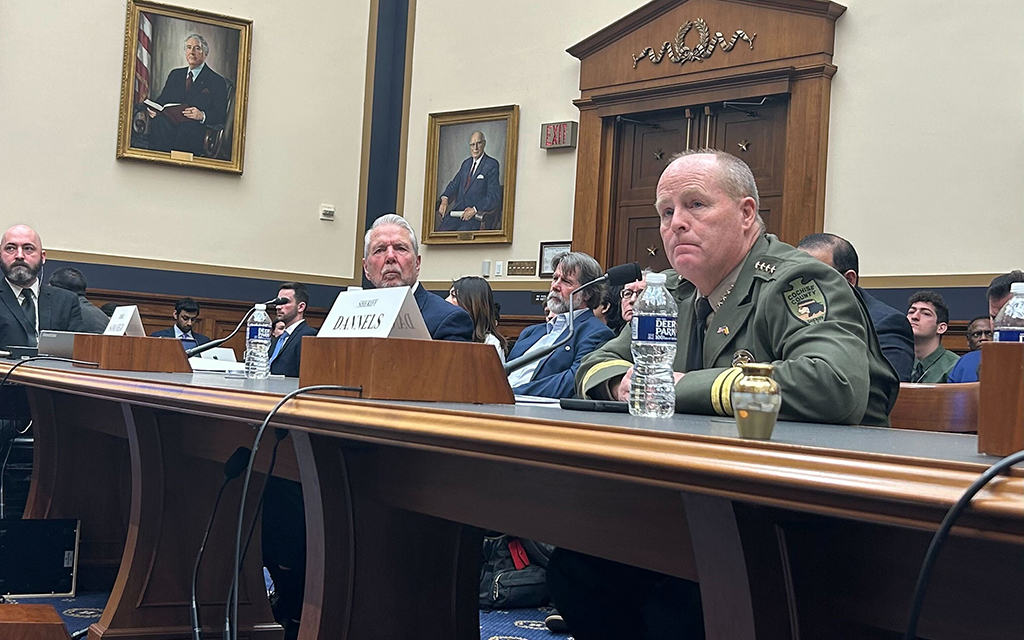
The Supreme Court had scheduled arguments in Arizona v. Mayorkas for March 1, but pulled the case from its calendar Thursday, less than two weeks before the hearing. The case is a challenge by states to a Biden administration plan to end Title 42, a policy that makes it easier to turn away asylum seekers at the border. (File photo by Vandana Ravikumar/Cronkite News)
WASHINGTON – Arizona was already edging away from a legal challenge by states trying to keep the Title 42 border policy in place when the Supreme Court on Thursday took the case off its calendar.
Arizona Attorney General Kris Mayes, a Democrat, had quietly backed away earlier this year from the lead role taken by her predecessor, Republican Mark Brnovich, declining to argue the case before the court but keeping Arizona as a party to the suit.
Arizona v. Mayorkas was scheduled to be argued before the court March 1, with the Louisiana attorney general taking the lead. But the justices Thursday removed the case from the calendar.
The justices did not give a reason for the move, saying only that the case has been removed from the February argument calendar. It did not appear to have been rescheduled as of Thursday night.
But in court filings earlier this month, the government argued that the case became moot when the Biden administration said it is ending the COVID-19 emergency that had been the justification for Title 42.
Mayes’ office declined to comment on its earlier decision to take a back seat on the case, and it did not immediately respond to a request Thursday for comment on the court’s action
The Louisiana attorney general’s office would not speculate on why the case was removed from the schedule, but took care to note in a prepared statement that “the Supreme Court did not dismiss our case or dissolve our stay pending certiorari of the termination of Title 42.”
“(Louisiana) Attorney General Jeff Landry and his office remain committed to ensuring that American citizenship means something and that those in this country illegally are not conferred greater rights than our citizens,” said in a statement from the office.
Analysts said that while the latest move by the court may not end the fight over Title 42, it could end what critics called a purely political play by GOP-led states.
“Brnovich joining the argument essentially was a political argument anyways, because it was already being made. The case (was) already being made,” said Chuck Coughlin, president of HighGround Consulting Inc. “So does Arizona need to add its voice to it? And usually people do that to add their names to it to elevate their own stature or their own position.”
Mario Diaz, a political consultant who led Democrat Janet Napolitano’s 1998 campaign for attorney general, said many lawsuits filed by states are “political by nature.” He called such suits “a tool in the toolbox for attorneys general that can’t control federal policy per se by making it.”
“This is a pattern that Republican attorneys general across the country have taken to shed some sort of light that’s perceived as a failure from the Biden administration,” Diaz said. “Anybody can sue anybody for anything, right?”
The case involved a challenge by Brnovich – along with attorneys general for Louisiana, Missouri and 16 other states – to a U.S. District Court ruling that would have ended the use of Title 42, a public health law that lets border officials to turn people away to prevent the spread of disease. The Centers for Disease Control and Prevention called for Title 42 to be imposed in March 2020, at the start of the COVID-19 pandemic.

A migrant heads back to Mexico after being encountered by Border Patrol agents near Sasabe in March 2020, shortly after Title 42 was enforced as a COVID-19 measure. The Biden administration’s plans to end the policy, now that the pandemic has waned, has been challenged by states, including Arizona. (Photo by Jerry Glaser/Customs and Border Protection)
When the CDC said in April 2022 that the law is no longer needed, it sparked a number of lawsuits, some trying to force the government to end the use of Title 42 and others seeking to keep it in place at a time of record-high border crossings.
The Arizona case was in response to a federal district court ruling in Washington, D.C., that ordered an end to enforcement of Title 42 nationwide. The states tried to join an appeal of that ruling, but were turned down by an appeals court that said they had waited too long on a case they knew was coming since April.
Arizona asked the Supreme Court to put the lower court rulings on hold and to hear the states’ request to intervene in the case, calling Title 42 “one of the last remaining tools at the southern border.”
“Getting rid of Title 42 will recklessly and needlessly endanger more Americans and migrants by exacerbating the catastrophe that is occurring at our southern border,” Brnovich said in a statement released with the request for a stay. “Unlawful crossings are estimated to surge from 7,000 per day to as many as 18,000.”
The justices agreed on Dec. 27 to stay the lower courts’ rulings, and scheduled arguments for March 1.
But in legal filings last week, the federal government pointed to President Joe Biden’s Feb. 10 announcement that he plans to end the national COVID-19 emergency on May 11. That action “would render this case moot,” the filing said.
While next steps in the case were not clear Thursday, critics said courts should not be used by the states in an attempt to affect federal policy.
“There’s other ways to make your case known rather than then suing our federal government,” Diaz said.
It is also unclear how Mayes will proceed, but Diaz said that as an attorney general for a border state, she is likely “talking to the administration and giving recommendations of what she sees on the ground, what she hears from border communities, her understanding of immigration policy.”
Mayes is not the only Democrat in Arizona to balk at the thought of an end to Title 42, but Coughlin thinks she probably considered the Supreme Court case a waste of “political capital” on an issue that will require compromise to address.
Mario Montoya, a research analyst for the nonprofit Aliento, said it seems “like the states were mistakenly trying to use Title 42 to restrict immigration instead of (using) it for the public health concerns, which is what it had to do with.” He said the policy has been leaving those coming to seek asylum in the U.S. in a risky situation “without due process.”
“We’re turning a lot of people that are being persecuted at the border, and either turning them away to their country or leaving them at the at the border,” Montoya said. “This is already a vulnerable population that we see that are fleeing persecution of violence.”


